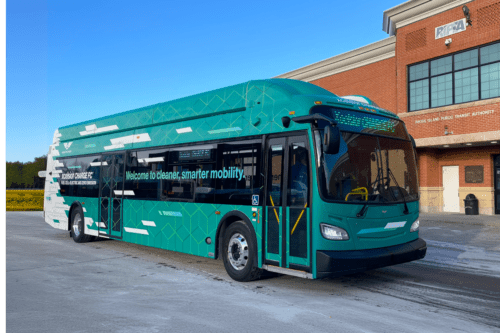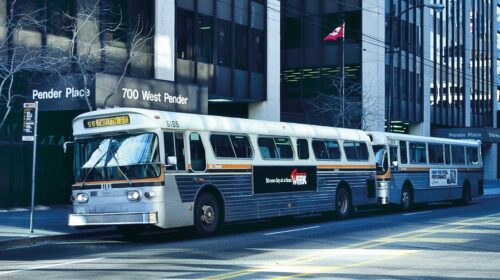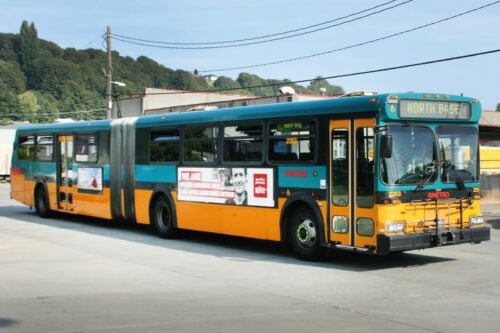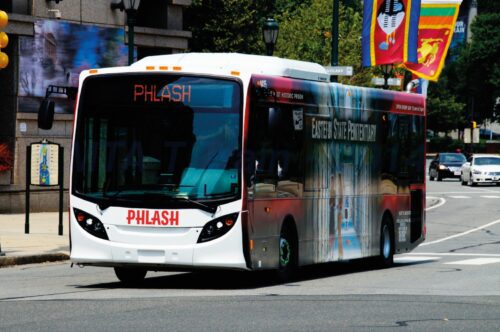
its Xcelsior Charge range, including hydrogen fuel cell and battery variants. NFI GROUP
Jonathan Welch takes a whistlestop tour of Alexander Dennis parent company NFI Group to see what’s behind the name
Following the recent warning from Alexander Dennis parent company NFI that its UK operations needed to be streamlined, and the subsequent announcement of the consultation on the closure of its Falkirk manufacturing site, who is NFI Group, and what relevance does it have in the worldwide market? Probably little known outside its native North America, NFI Group describes itself as a leading independent global provider of sustainable bus and motorcoach solutions, which is leading the evolution to zero-emission mobility. It has battery-electric and fuel cell-electric vehicles in service in more than 150 cities in six countries which between them have completed over 220 million electric service miles.
The company says it has a vision to lead the evolution of sustainable on-road mass transportation and mobility, and a mission to design, deliver, and support market-leading bus and motorcoach solutions that are safe, accessible, efficient, and reliable. In the first quarter of 2025, it delivered a total of 348 zero-emission buses, representing 33.9% of new deliveries, and taking its total of zero-emission vehicles produced since 2015 to 4,987. The company claims to have the largest zero-emission bus production capacity in North America and the UK, with over 3,500,000 square feet of production space across 14 ZEB-capable production facilities, and the ability to produce up to 8,000 vehicles per year.

Vehicle variety
Based in Winnepeg, Canada, NFI Group employs around 8,500 people internationally across 50 separate facilities in nine countries, and has a product range across its subsidiaries which encompasses heavy and medium duty buses, single-deck, articulated and double-deck buses, coaches and partial low-floor vehicles as well as accessible transport. Alongside Alexander Dennis/Plaxton and its namesake New Flyer, the Group owns ARBOC Specialty Vehicles, Motor Coach Industries, NFI Parts, and Carfair Composites. It was created on 16 June 2005 as a holding company of New Flyer, to allow it to be publicly traded on the Toronto Stock Exchange.
Brazilian bus and coach builder Marcopolo acquired a 19.99% stake of New Flyer in 2013, which it reduced to 10.8% in 2016. The Group has grown through mergers and acquisitions, including the aftermarket parts business of rival Orion, a Daimler brand, and North American Bus Industries (NABI). Upon completion of outstanding orders, New Flyer converted the NABI factory in Alabama into a fourth facility to produce its own Xcelsior bus range. In 2015, New Flyer acquired coach (or motorcoach in American parlance) manufacturer Motor Coach Industries (MCI), adding ARBOC to its portfolio two years later. In May 2019, the NFI Group purchased Alexander Dennis and its Plaxton subsidiary in a £320 million deal. New Flyer itself was founded in 1930 as Western Auto and Truck Body Works, that primarily selling buses in Western Canada before changing its name to Western Flyer Coach in 1948. The company was taken over by the Government of Manitoba in 1971, becoming Flyer Industries, before being acquired by Dutch manufacturer Den Oudsten in 1986, gaining the name New Flyer Industries at the same time.

Like Alexander Dennis in the UK market, MCI is a familiar brand that remains in NFI’s US line-up. Its history is somewhat more convoluted, having been incorporated in 1933 as Fort Garry Motor Body and Paint Works in Winnepeg, Manitoba. In 1948, Greyhound Lines of Canada, a major customer, became a majority shareholder when it purchased 65% of the company, buying it outright in 1958. Having seen a successive series of ownership changes, MCI became an independent company in 1993, and went on to declare bankruptcy in 2008, finally emerging from its voluntary ‘Chapter 11’ status in 2009. A 2012 partnership saw it become the US agent for Daimler’s Setra range, at the same time as Daimler sold its Orion business to New Flyer. The partnership ended in 2018, three years after the company had been acquired by New Flyer.
Prior to the acquisition of Alexander Dennis in 2019, in 2012 New Flyer and Alexander Dennis announced a plan to manufacture a medium-duty low-floor midi bus for the North American market, based on the Enviro200 and called the New Flyer MiDi. Around 200 buses are reported to have been delivered to 22 operators in Canada and the United States before the venture ceased in 2017, production of the vehicle moving to Alexander Dennis’ own new North American factory in Indiana, where it would be produced alongside the US-specification version of its Enviro500.


